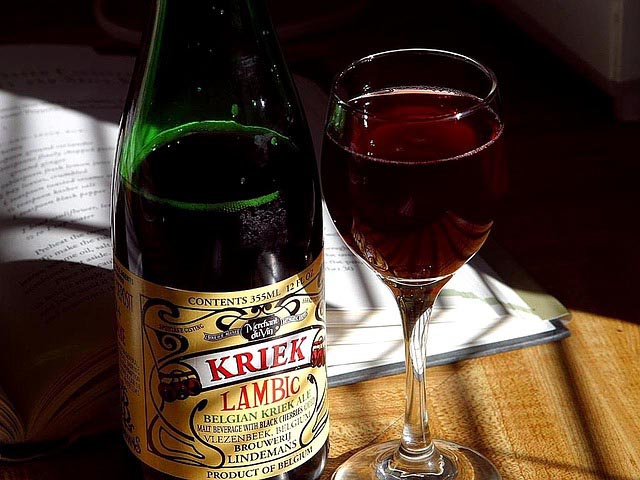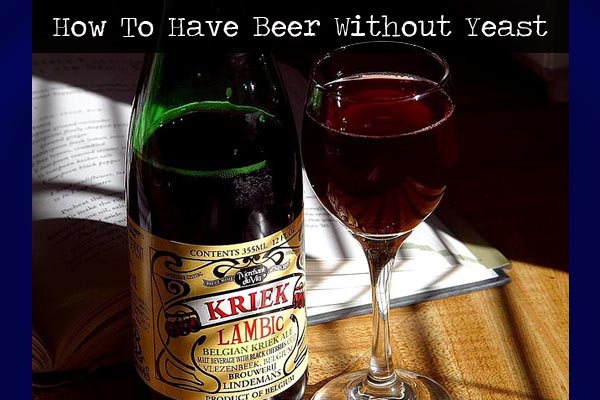There are a few reasons you may not want to brew or buy a beer with yeast. It could be that you don’t have the strain of yeast you need. Or it could go much deeper if someone has yeast intolerance.
But can there be a beer without yeast? You can’t make traditional beers such as an amber or lager without yeast. However, a lambic beer is brewed without the addition of any specific yeast strains during the brewing process.
Why You Can’t Normally Make Beer Without Yeast
When we ran though the four key ingredients in brewing beer we list yeast as a critical part of the fermenting process. Yeast is a fungus and it’s literally everywhere! When you add yeast to your wort you’re not just adding a packet (or less) like you would with bread our dough. You’re adding a lot of yeast to your wort even if you’re brewing in smaller batches.
If yeast weren’t around the process of fermenting wouldn’t be able to turn all of the sugars into alcohol. And that process starts even as you pitch the yeast into the wort. Although there’s not a way to make beer or wine without yeast there are some workarounds to make beer without adding additional yeast to your wort. And that’s by making or buying a lambic beer.

What is Lambic Beer?
In a way, lambic beers are definitely more interesting than any other beer that’s out there. Every other commercial beer has a strict recipe to use, especially, when it comes to the yeast. Even the specific strain of yeast used in commercial beers does not have a variation.
Since lambic beers don’t have yeast added the sugars must convert to alcohol from natural processes. In the case of a Belgian lambic beer the vats are left open for wild yeasts and bacteria to get to work, and the vats are stored for up to 3 years to allow for fermentation. This is called spontaneous fermentation and is different from traditional beers where you want to ferment in a closed vessel that is air tight.
With thousands of yeast strains and different bacteria around there’s no controlling the impact on the flavor profile of the beer. Basically, it is what it is.
Why Lambic is the Best Beer for Yeast Intolerance and Allergies
If you have yeast intolerance or allergies it doesn’t mean you have to completely eliminate beer from your life. Lambic beer will be your best beer for yeast intolerance or allergies. Since there’s no yeast added to the beer you’re only drinking yeast that is naturally in the environment.
Although lambic beer will still have yeast it may be at a low enough level to not trigger an intolerance or allergic reaction. This is the time to know your body and see if you want to give this beer a shot.
What Does Lambic Beer Taste Like
When you hear others describe the taste of lambic beer you might hear words like “funky”, “interesting”, or “unique”. And you’ll always have varying descriptions to the taste of lambic beer because the taste of the beer can’t be controlled as much as much as it can from a brewery. The reason is because of the brew process.
What you end up with is a beer that has a little bit of carbonation and a pretty sour taste. I’m not sure that it’s something that really appeals to the masses. You’ll find in a lot of lambic beers is a lot of fruity flavors added in. Raspberry, grape, apricot, and cherry among other flavors will help mask that sour taste and allow the beer to be more likable. However. you can still find these beers without additional flavor added.
Final Thoughts
It is impossible to find any beer without yeast, but we can come darn close to it. With a lambic beer spontaneous fermentation takes place and the beer will ferment from natural processes in the enviroment.
Although the beer can taste a little different from one beer to the next the beer definitely has a loyal following. Especially, as brewers add in other flavors to take away some of the tartness from the beer.
A lambic beer is also the best beer for yeast intolerance and allergies. This is because there’s no additional yeast added to the wort like what happens with other brewed beers. The only yeast that gets in to ferment the beer are only the yeast that naturally occurs in nature.
I hope you give this beer a shot and find it unique and special.

